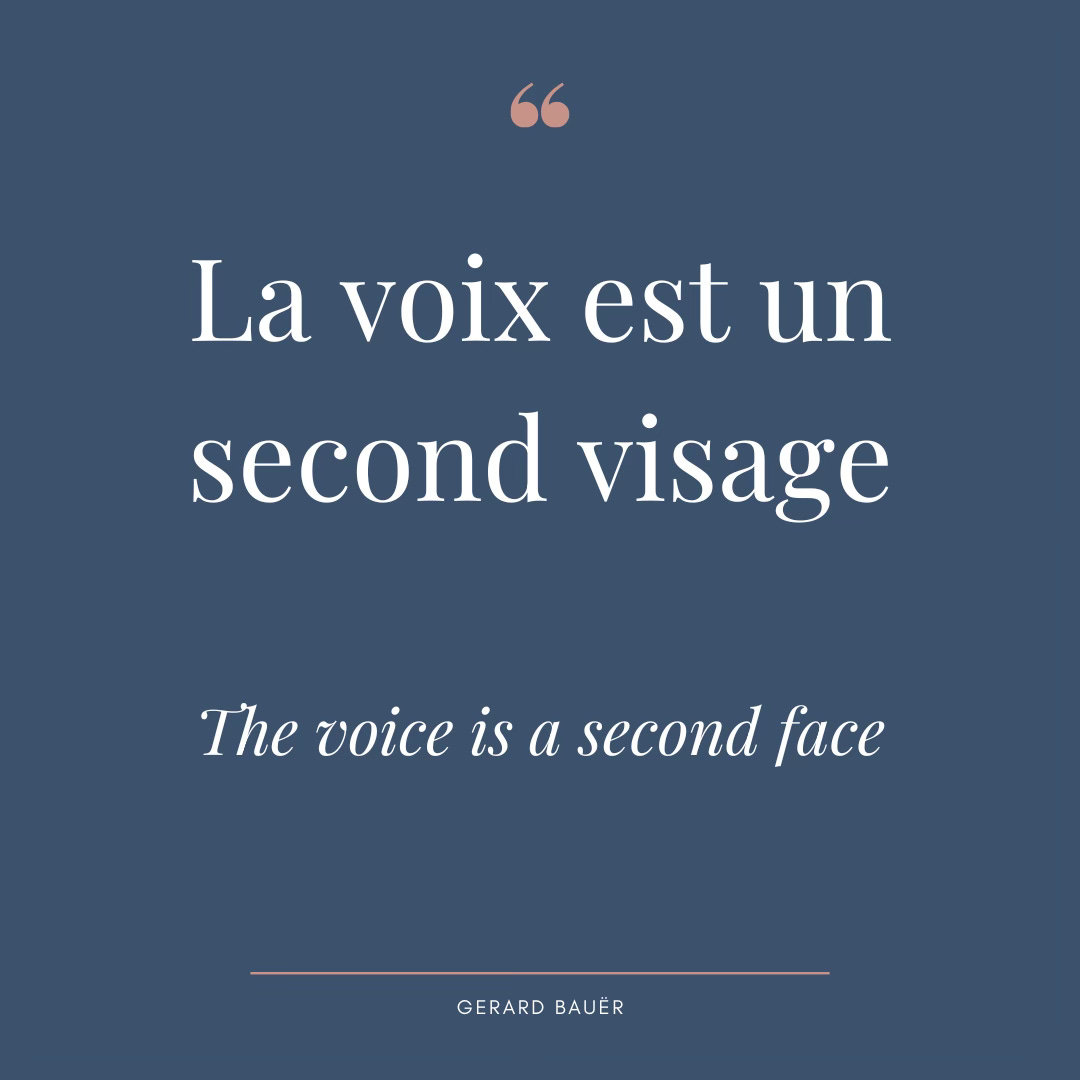Finding my voice in Paris
Spoiler: I found a few. And if you look, I suspect you'll find the same.
Welcome back.
If you were with me last time, I left you pondering your words. And no surprise, I’m moving on to the la voix - your voice.
And I don’t mean the vibrations of your vocal cords that form the sounds we use to deliver those words. I mean something bigger. Grander. More intimate.
Whether spoken or written, your voice is your unique perspective, your views, and your values…it’s a reflection of your identity. I believe the concept of the voice is what connects us to our truth.
So, I’ve been thinking a lot about voices. My voice. Your voice. Our voices. How we use them, how we lose them, how we find them again - irrespective of the sounds they make.
Speaking of sounds…
Did you know that the human voice is nothing short of a miracle? And, apparently, like the human brain, we use very little of its capabilities (unless you are a beatboxer…)
It’s amazing to imagine that from this one tiny part of our body comes a symphony of pitch, tone, emotion, meaning, etc. You only have to listen to a native French speaker to see the sheer dexterity and musicality of the human voice, not to mention all the non-word sounds: the sighs, the mmhms, the baahhhs, the expressive pfffs that say more than words ever could.
After twenty years in Paris, I have finally tuned the most expressive pfff you could imagine.
It’s incredible - not just my pfff, but the voice.
Our voice is how we show ourselves to others— it’s what people "see" when they think of us.
Speaking of what people see…
Through writing, I’ve been showing a different side of myself lately. I thought it was about time. It could be new to you, and I’ll admit it’s a side even I hadn’t fully met before.
After reading my last post, my friend Drew sent a lovely message to say she enjoyed it. Nothing invites equal parts joy and panic like realizing your friends are actually paying attention to what you're doing.
My response to her was something along the lines of : “I am having fun finding my voice." After I pushed send on the email, I thought to myself: what in the heck does that mean? Finding my voice?
If you ever hear me -or anyone else - say , “I’m trying to find my voice” please do take a moment to help us look for it. It seems there are quite a few of us on the hunt.
Of course, I cannot help but ask myself and others: Did we ever really lose it?
I don’t think so.
Whether or not I ever lost it is up for debate, but I do know I have been building it bit by bit here in Paris. In any case, my voice is an awfully important part of me, so I am determined to continue to look for it.
Speaking of looking for my voice…
When I started looking for my voice, I unearthed a great surprise. In my search for one true voice, I happened upon the vocal version of a clown car.
As I started to look closely, not just one, but many versions of my voice started popping out!
No need to worry—I uncovered voices, not personalities. Then again… maybe they’re not so different?
Perhaps this is something that I have come to learn and love about French culture—it is perfectly acceptable and almost expected to have different versions of yourself. There is such a clear divide between la vie professionnelle and la vie personnelle - there is never even a question about them intermingling. It would be seen as presumptuous and rude to expect so. A colleague in a business setting might never show you who they are privately. C’est normale.
Voices I have discovered in Paris:
Having spent much of my adult life in Europe, I know that cultural norms have influenced my voice(s). Above all, what I’ve learned is this: our voices are as dynamic as we are.
Here are just a few of mine:
My professional voice varies depending on the circumstances and the people I am speaking with—whether I am speaking with a client, a new business relationship, a long-term business relationship, or a heated negotiation.
My private voice: many different versions depending on whether I am at a social event with people I know well or people I don’t know, whether it is a close friend with whom I can let my hair down, or whether I am with family.
My French-speaking voice: this one tends to be direct and sharp - because I don’t have the nuance to sound eloquent. I often try to add a smile to soften it or find something for us to mutually complain about. FYI - A fascinating article from Psyche Today suggests that people often take on a slightly different personality when speaking another language. (Science says: language activates different brain regions, shifts body language, and even alters decision-making styles.)
My list goes on.
Within those three buckets, you’ll know that there are many derivatives. The important thing is that they are all authentic. All are me.
Professor Bruce Hood’s book The Science of Happiness reminded me that all those different voices are not just normal—they are necessary and healthy. These variations simply reflect the context, our connection with others, our communities, and the present circumstances. In effect, having the same voice no matter what is inappropriate. You need to have other voices.
I often ask myself if that is part of Paris’s magic. Maybe that’s why people flock here from all over the world: to try on their ‘other’ voices. To discover their other selves. To be someone else for a while—to release themselves from any expectations and not be judged for it.
Speaking of being judged…
Enter Madame de Sévigné, who was judging everything and everyone!
Considered one of the great letter-writers of French literature, Madame de Sévigné (1626-1696) was a French aristocrat best known for her vivid and expressive letters, mostly to her daughter.
Her letters describe life in Louis XIV’s court, Parisian high society, and the everyday concerns of aristocratic women. She wasn’t just writing about parties and local gossip—she captured everything from mundane life to political scandals.
Sharp and full of descriptions, her writing provides valuable historical insight, especially from a woman’s perspective.
More than three hundred years later, Madame de Sévigné is still referenced today for historical accuracy because she showed us the power of the voice—honest, vivid, unafraid … and always speaking the raw truth—la vérité.
Beyond just expressing the truth, one of the most important things she left us with is a reminder of the importance of our voice - we can only ever lose one voice, and that one voice is everything.
Speaking of the one true voice…
So yes, our voices branch out like a family tree. They grow, twist, and adapt to seasons and storms - just as we do. But if we’re lucky, we can trace them back to the same sturdy trunk: Our truth.
Enter a word I have come to love: Parrhesia
A word first mentioned in 5th-century Greece by Euripides, it means the freedom and obligation to speak the truth, to speak candidly, to speak boldly.
For me, it means to have the fortitude to speak with the kind of honesty we offer to people we genuinely love and trust. The kind that says, "This will hurt you to hear as much as it will hurt me to say, but I care too much to let it sit in silence."
To me, being a Parrhesian (FYI - I just coined that word - but let’s all use it) is a kind of ethos - it’s someone who chooses truth over comfort. It’s a voice that says: let’s be real with each other. Let’s say the hard thing. Let’s show up with our full voice—even when it’s shaky.
Bonus: I love the word even more because phonetically, it sounds very similar to my fellow countryman, the Parisian.
And how perfect is that? Parisians are famously honest. Often blunt. Definitely bold. How apropos.
So, friends, that’s the only real compass I’ve found so far. No matter which voice I use, I ask: Is it in line with my truth? Or my inner Parrhesian?
If it is, I go with it—even if it’s rough, raw, or unrehearsed.
So here I am, still asking questions. Still tuning in to my voice(s). And maybe, just maybe, sharing my different voices will prompt you to tune into yours.
Whatever voice you land on—use it fiercely.
I think it’s beautiful.
A prompt I’ll leave you with:
What are your many voices, and how will you use them?
With that, see you next time. Á bientôt mes amis.
Jane
PS—I find it so beautiful that in French, the word for your Voice and to Vote are the same: La Voix. How poetic.
Less poetic: Avocat. Which can mean either Avocado OR Lawyer. But in the interest of sharing.
A few last things:
If you want to find your voice in Paris, join me:
My GenerateHER retreats are live! I am so excited to host the next sessions this autumn!
If you want to hear my voice in Paris, join me on my podcast:
I publish an episode each week. I’d love it if you listened to it and let me know what you think! You can find more here.











This article resonated deeply with me Jane, on many levels. For years my family and friends have commented how completely different I sound and act when speaking French. Admittedly, I very much like my French voice! My other voices (in particular the writer, the poet, the recipe writer) have been very quiet the last 5 years. I hadn’t thought about it much beyond noticing the silence, but now… I’ll be taking a closer look. Merci Jane!
Love this, Jane - so fascinating! Especially this bit "FYI - A fascinating article from Psyche Today suggests that people often take on a slightly different personality when speaking another language. (Science says: language activates different brain regions, shifts body language, and even alters decision-making styles.)" I, too, find I feel like a different person when I am speaking French (in France as opposed to the classroom), it's nice to have that different hat to wear sometimes!